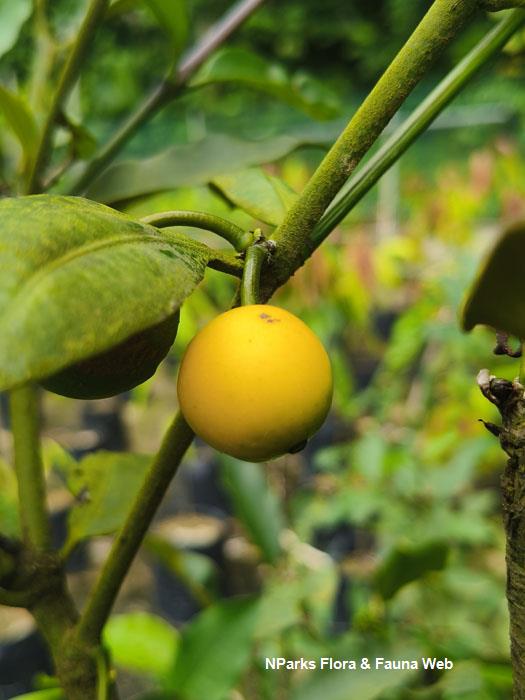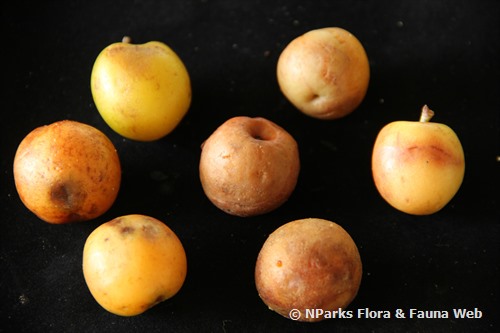
Back
Garcinia dulcis (Roxb.) Kurz
| Family Name: | Clusiaceae (Guttiferae) |
| Synonyms: | Xanthochymus dulcis Roxb., Garcinia elliptica Choisy, Xanthochymus javanensis Blume, Stalagmitis dulcis Cambess., Stalagmitis javanensis Spach |
| Common Name: | Yellow Mangosteen, Mundu, Gourka, Maphut, Baniti, 瓜哇凤果 |
Name
Classifications and Characteristics
| Plant Division | Angiosperms (Flowering Seed Plants) (Dicotyledon) |
|---|---|
| Plant Growth Form | Tree (Small (6m-15m)) |
| Lifespan (in Singapore) | Perennial |
| Mode of Nutrition | Autotrophic |
| Maximum Height | 13 m |
Biogeography
| Native Distribution | Indian Ocean (Andaman & Nicobar), Philippines, Peninsular Malaysia, Indonesia (Java, Kalimantan) |
|---|---|
| Native Habitat | Terrestrial |
| Preferred Climate Zone | Tropical, Sub-Tropical / Monsoonal |
| Local Conservation Status | Non-native (Horticultural / Cultivated Only) |
Description and Ethnobotany
| Growth Form | It is a tree, up to 13 m tall, with parts exuding white latex when damaged. |
|---|---|
| Trunk | Its trunk is short, with brown bark. Its twigs are usually finely hairy. |
| Foliage | Its oppositely-arranged, stalked leaves have leaf blades that are ovate to oblong-elliptic, 10-30 cm long and 3.5-14 cm wide, dark green and shiny above, and usually hairy on the underside. |
| Flowers | It produces male and female flowers on separate plants, and sometimes bisexual flowers as well. Its yellowish white flowers are borne in small clusters of 5 at the axils, about 6-12 mm wide, and smells sour. |
| Fruit | Its fleshy fruits are round berries that are 5-8 cm wide, with a pointed tip that ends with a persistent stigma, and ripens light yellow in colour. |
| Associated Fauna | Its fruits are probably eaten by small mammals. |
| Cultivation | It can be propagated from seed. |
| Etymology | Latin Garcinia, after Dr Laurent Garcin (1683-1751), a French naturalist with the East India Company; Latin dulcis, sweet tasting. |
| Ethnobotanical Uses | Edible Plant Parts : Edible Fruits Food (Fruit or Vegetable): Fruits can be eaten raw, pulp is juicy but sour, served in sherbets, or made into jams and preserves. Medicinal: Pounded seeds applied onto swellings. Fruit extracts used as expectorant for coughs, or to treat scurvy. Crushed roots used to relieve fever and counteract poisoning. Crushed bark and gum resin used to treat wounds, sores and ulcers, as well as applied onto decayed teeth to make them fall out. Anti-bacterial and anti-oxidant compounds extracted from flowers. Others: Bark yields a black dye used for colouring mats and cotton. Unripe fruits provide an inferior-quality gamboge (mustard yellow) pigment. |
Landscaping Features
| Desirable Plant Features | Ornamental Fruits |
|---|---|
| Landscape Uses | General |
| Thematic Landscaping | Economic Garden, Naturalistic Garden |
Fauna, Pollination and Dispersal
| Pollination Method(s) | Biotic (Fauna) |
|---|
Plant Care and Propagation
| Light Preference | Full Sun |
|---|---|
| Water Preference | Moderate Water |
| Plant Growth Rate | Moderate |
| Rootzone Tolerance | Fertile Loamy Soils, Well-Drained Soils |
| Maintenance Requirements | Moderate |
| Propagation Method | Seed, Air-Layering |
Foliar
| Foliage Retention | Drought / Semi-Deciduous |
|---|---|
| Mature Foliage Colour(s) | Green |
| Mature Foliage Texture(s) | Smooth, Glossy / Shiny, Leathery, Thick |
| Foliar Type | Simple / Unifoliate |
| Foliar Arrangement Along Stem | Opposite |
| Foliar Shape(s) | Non-Palm Foliage (Oblong) |
| Foliar Venation | Pinnate / Net |
| Foliar Margin | Entire |
| Foliar Apex - Tip | Acute |
| Foliar Base | Rounded / Obtuse |
| Typical Foliar Area | Mesophyll ( 45cm2 - 182.25 cm2 ) |
| Leaf Area Index (LAI) for Green Plot Ratio | 4.0 (Tree - Dense Canopy) |
| Prominent Young Flush Colour(s) Remarks | Pale Green |
Non - Foliar and Storage
| Trunk Type (Non Palm) | Woody |
|---|---|
| Mature Bark Texture | Scaly |
| Stem Type & Modification | Woody |
| Root Type | Underground (Fibrous Root, Tap Root) |
Floral (Angiosperm)
| Flower & Plant Sexuality | Unisexual Flowers , Dioecious |
| Ovary Position | Superior / Hypogynous |
|---|
| Flowering Period | Hot & Dry Period |
| Flowering Habit | Polycarpic |
Fruit, Seed and Spore
| Mature Fruit Colour(s) | Orange, Yellow / Golden |
|---|---|
| Fruit Classification | Simple Fruit |
| Fruit Type | Fleshy Fruit , Berry |
Image Repository
Others
| Master ID | 1632 |
|---|---|
| Species ID | 2925 |
| Flora Disclaimer | The information in this website has been compiled from reliable sources, such as reference works on medicinal plants. It is not a substitute for medical advice or treatment and NParks does not purport to provide any medical advice. Readers should always consult his/her physician before using or consuming a plant for medicinal purposes. |







